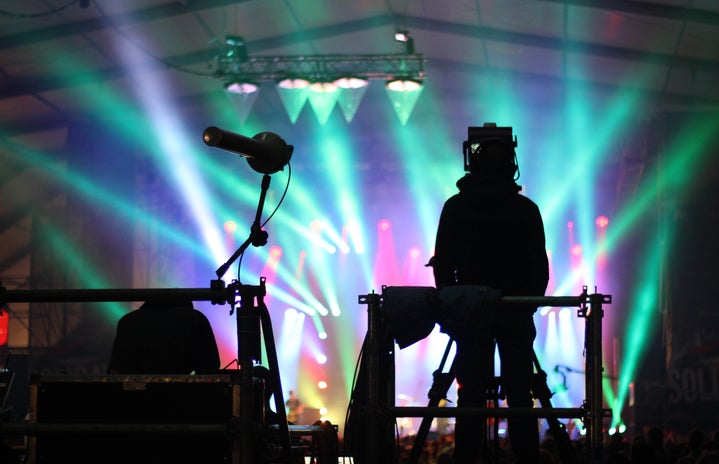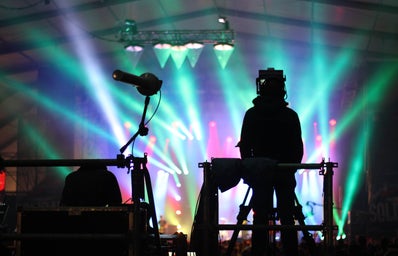It was happening. On a bright and sweltering Saturday in July, a man in his late twenties took the small concert stage at Louisiana’s most popular amusement park. It was Panic! at the Disco, and the wait was finally over. How many times had middle-school me fantasized about that moment? That moment where, until that day, I hadn’t thought would occur. How many times had my younger self silently sung along to “Build God, Then We’ll Talk” with a printout of its lyrics in front of me, while my pink iPod nano played the song on repeat? The answer is many times. Many, many times.
As I watched Brendon Urie take the platform, I couldn’t help but ponder all of these things. It’s a weird experience to finally see a band you had been waiting so long to witness in concert. It’s strange and somewhat difficult to reconcile your feelings of the band you fell in love with in the beginning and the band you see play.
My love affair with Panic! at the Disco began early, as a wee sixth grader; back then, I was a teacher’s pet, clad with purple wire framed glasses and a bad set of goody-two-shoes tendencies. I think it was a shock to everyone, then, when I fell in love with the punk, eyeliner-wearing, eccentric ~rockers~ of Panic.
After one viewing of the “I Write Sins Not Tragedies” music video, I quickly succumbed to Brendon Urie’s beautiful vocals and straightened, emo hair. I had a song for every mood, which was, more often than not, fake angst (Twilight had just been published, give me a break).
Seeing them live ten years and multiple albums later was, I suppose you could say, a ~pretty odd~ experience (see what I did there?). Gone was the skinny boyishness of Urie and the rest of the guys—all that was left was Urie, now considerably older and recently married, who had a newfound knack for doing backflips on stage and singing in a falsetto voice.
In that moment though, it didn’t matter to me that all of the other original band members had left the group. And as I looked around to the other fans around my age, I don’t think it mattered to them either. As long-time fans, we were used to Panic’s sound changing drastically between each album; Urie on his own was just another phase in the band’s journey. We had stuck with this band faithfully through it all.
However—as much as it pains me to admit—being a fan since my middle school days had instilled within me a bizarre, almost hipster-esque pretension aimed at younger, newer fans. I had loved Panic! at the Disco for a decade; it was weirdly horrific to sing along to songs I had known since they played on the radio next to young teenage girls wearing P!ATD shirts from their most recent album.
“These are not true fans,” a tiny, sneering voice within me whispered. “I bet they don’t have A Fever You Can’t Sweat Out on ~compact disc~… they probably just have like, three songs on their iTunes accounts.” Try as I might, I couldn’t suppress these jaded thoughts.
“This was supposed to be my moment,” hipster-me said. These newbies should go back to loving One Direction. I hadn’t pined to see Panic! at the Disco for ten years only for my view to be obstructed by a hoard of gyrating teeny-boppers and their weary parents. No no NO. I deserved this experience to be perfect—I owed this to my younger self. The only thing I had over them was that I knew all of the words to every song. Every. Single. Song (take that, you recently post-pubescent suckers).
But, then I started to think—is this what it feels like to the older generations when kids our age claim to love music from their day? Is this how old dudes feel when they see a college student in a Grateful Dead T-shirt, or a pimply young musician searching for old Bob Dylan records at garage sales? Am I old??
Once the music began, however, a lot of these jaded thoughts and judgments began to fade away. As the music played, I sang along and danced in the crowed that was filled with both old fans and new. I was so happy; not only was I enjoying the music, but I was also fulfilling a promise to my younger self. Watching the band live, with hundreds of other people who shared my love, was strangely unifying—I didn’t care whether the people I stood next to had obsessed over them as long as I had. We all loved Panic! at the Disco; everything else was irrelevant.
Regardless of the age you were when you made them, bucket lists are important. I think it’s crucial to go and experience the things you wanted to do when the opportunity arises. Fulfilling promises to your younger self can take you back to those days where you didn’t have a care in the world. It can also take you back to actually acting that age, as can be seen from my somewhat hateful inner dialogue to the youngsters enjoying the music of a now only-slightly relevant band.
As the concert went on into that hot July evening, I realized just how ridiculous my pretentiousness was. Music has a way of bringing people together, and it didn’t matter whether these people fit my idea of what a “true” fan was or not. The important thing was that I was there, in the flesh, listening to my favorite band from 10 years ago (and if we’re being honest, my love for them remains just as strong to this day). I still have many things to fulfill for my younger self—mainly relating to Disney channel and travelling—but I think it’s important for everyone to tap into their past selves and see what long-held desires they haven’t accomplished yet. And also to keep on adding things to the list as they come up. Whether it’s something as basic as seeing your favorite band from middle-school in person, or as grand as owning your very own miniature pony, it’s important to keep doing things that would make your younger self proud.
As the set list came to an end, I felt like I could successfully check this concert off my middle school bucket list. That being said, the next on the agenda—marriage to Cole Sprouse from The Suite Life of Zack and Cody—might be a tad bit more difficult to attain.

